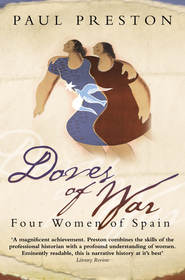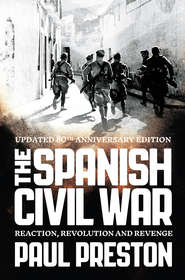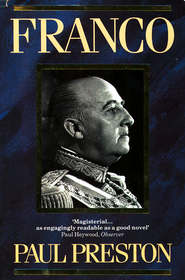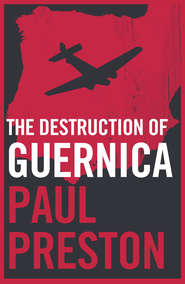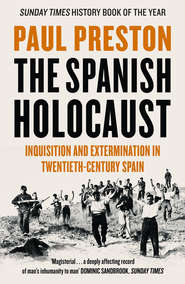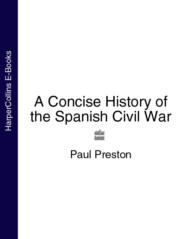По всем вопросам обращайтесь на: info@litportal.ru
(©) 2003-2024.
✖
Juan Carlos: Steering Spain from Dictatorship to Democracy
Настройки чтения
Размер шрифта
Высота строк
Поля
(#litres_trial_promo)
In fact, the brief flirtation between some monarchists and the Axis soon came to an end. It was clear that the fate of the monarchy would be better served by alignment with the British. Soon after her husband’s death, Victoria Eugenia had returned to her home in Lausanne, La Vieille Fontaine. In the summer of 1942, Don Juan moved his family there too and, shortly afterwards, appointed the four-year-old Juan Carlos’s first tutor. His strange choice was the gaunt and austere Eugenio Vegas Latapié, an ultra-conservative intellectual. In 1931, appalled by the establishment of the Second Republic, Vegas Latapié, for whom democracy was tantamount to Bolshevism, had been the leading light of a group which set out to found a ‘school of modern counter-revolutionary thought’. This took the form of the extreme rightist group, Acción Española, whose journal provided the theoretical justification for violence against the Republic, while its well-appointed headquarters in Madrid served as a conspiratorial centre.
(#litres_trial_promo) Shortly after the creation of Acción Española, Eugenio Vegas Latapié had written to Don Juan and a friendship had been forged. Ironically, Vegas Latapié had helped elaborate the idea that the old constitutional monarchy was corrupt and had to be replaced by a new kind of dynamic military kingship, a notion used by Franco to justify his endless delays in restoring the Borbón monarchy. Now, as a faithful servant of Don Juan, his outrage at this was such that, despite having served in the Nationalist forces during the Civil War, he turned against Franco. In April 1942, Don Juan asked Vegas Latapié to join a secret committee with the task of preparing for the restoration of the monarchy. When Franco found out, he ordered both Vegas Latapié and Sainz Rodríguez exiled to the Canary Islands. Sainz Rodríguez took up residence in Portugal and Vegas Latapié fled to Switzerland where he became Don Juan’s political secretary.
Deeply reactionary and authoritarian, Vegas Latapié had a powerfully sharp intelligence but seemed hardly suitable to be mentor to a four-year-old child, particularly one who was far from intellectually precocious. Inevitably, Vegas Latapié’s nomination as the boy’s tutor did little for the rather introverted Juan Carlos. Neither his tutor nor his father took much notice of him, their attention being absorbed by the progress of the War and plans for the return of Don Juan to the throne. Initially, Vegas Latapié’s role was, at Don Juan’s request, to give Spanish classes to Juan Carlos because the boy spoke the language with some difficulty, having a French accent and using many Gallicisms. When Juan Carlos reached the age of five, he began to attend classes at the Rolle School, in Lausanne. Vegas Latapié would accompany him to school in the morning and pick him up in the afternoon, using the trip to give the boy his extremely partisan and reactionary view of Spain’s past.
(#litres_trial_promo)
The relationship between Don Juan and Franco was developing in such a way as to dictate the direction of the young Prince’s later childhood, his adolescence and his adulthood. Fearful that the approaches made to the Germans by Don Juan’s supporters might bear fruit, on 12 May 1942, Franco had written him another patronizing letter based on his bizarre interpretation of Spanish history. In it, he rejected the notion that there was support in Spain for a restoration and reiterated his rejection of everything associated with the constitutional monarchy that fell in 1931. Linking the greatness of imperial Spain with modern Fascism, he stated that the only monarchy that could be permitted was a totalitarian one such as he associated with Queen Isabella I of Castile. He made it clear that there would be no restoration in the near future, and none at all unless the Pretender were to express his commitment to the Spanish single party, FET y de las JONS (Falange Española Traditionalist a y de las juntas de Ofensiva Nacional Sindicalista), created in 1937 by the forced unification of all right-wing parties.
(#litres_trial_promo)
Don Juan did not reply to Franco’s letter of May 1942 for ten months. The outbreak of violent clashes between monarchists and Falangists – and the consequent removal of Ramón Serrano Suñer – in mid-August 1942 boosted his confidence. The Allied landings in North Africa on 8 November 1942 convinced him that the best chance of a restoration was to distance himself from Franco and persuade the Allies that, after the War, the monarchy could provide both stability and national reconciliation. On 11 November 1942, barely three days after the landings, Don Juan’s most powerful supporter, General Alfredo Kindelán, the most senior general on active service and Captain-General of Catalonia, travelled to Madrid. After discussing recent events with the rest of the high command, Kindelán informed the Caudillo in unequivocal terms that if he had committed Spain formally to the Axis then he would have to be replaced as Head of State. In any case, he advised Franco to proclaim Spain a monarchy and declare himself regent. Franco swallowed his fury and responded in a conciliatory – and deceitful – way. He denied any formal commitment to the Axis, implied that he was anxious to relinquish power and confided that he wanted Don Juan to be his ultimate successor. Franco was seething. After a cautious interval of three months, he replaced Kindelán as Captain-General of Catalonia.
(#litres_trial_promo)
When Don Juan did finally reply to Franco’s letter, in March 1943, his tone was altogether more confrontational than before. He questioned Franco’s exercise of absolute power without institutional or juridical basis and expressed alarm at both the continued divisions within Spain and the international situation. He firmly informed Franco that it was his patriotic duty to: ‘abandon the current transitory and one-man regime in order to establish once and for all the system which, according to Your Excellency’s oft-repeated phrase, forged the greatness of our fatherland’. He bluntly stated that he found entirely unacceptable Franco’s vague formula of delaying the return of the monarchy until his work was done. Then, in terms that can only have horrified Franco, Don Juan roundly rejected the Caudillo’s call for him to identify with the Falange, asserting that any link with a specific ideology ‘would mean the outright denial of the very essence of the value of monarchy which is radically opposed to the provocation of partisan divisions and domination by political cliques and is rather the highest expression of the interests of the entire nation and the supreme arbiter of the antagonistic tensions inevitable in any society’.
In his letter, Don Juan outlined the formula for the eventual restoration of a democratic monarchy in Spain on the basis of national reconciliation – although he cannot have imagined that it would take a further 32 years. Recalling Alfonso XIII’s declaration in 1931 that he was ‘Rey de todos los españoles’ (King of all Spaniards), Don Juan presented Franco with a slap in the face for which he would never be forgiven: ‘In fact, my arrival on the throne after a cruel civil war should, in contrast, appear to all Spaniards – and this is precisely the transcendental service that the monarchy, and only the monarchy, can offer them – not as an opportunist government of a particular historical moment or of exclusive and changing ideologies, but rather as the sublime symbol of a permanent national reality and the guarantee of the reconstruction, on the basis of harmony, of Spain, complete and eternal.’
(#litres_trial_promo)
Franco’s outrage can be discerned both in the unaccustomed (for him) rapidity (19 days) in which he replied and in the unconcealed contempt of his tone. ‘Others might speak to you in the submissive tone imposed by their dynastic fervour or their ambitions as courtiers; but I, when I write to you, can do so only as the Head of State of the Spanish nation addressing the Pretender to the throne.’ He went on, condescendingly, to attribute Don Juan’s position to his ignorance and to lay before him a petulant list of what he regarded as his own achievements.
(#litres_trial_promo)
In the wake of Allied success in expelling Axis forces from North Africa in June 1943, Don Juan remained on the offensive. He could draw confidence from the fact that monarchists within the regime were beginning to fear for their own futures. At the end of the month, a group of 27 senior Procuradores (parliamentary deputies) from Franco’s pseudo-parliament, the Cortes, appealed to the Caudillo to settle the constitutional question by re-establishing the traditional Spanish Catholic monarchy before the War ended in an inevitable Allied victory. They believed that only the monarchy could avoid Allied retribution for Franco’s pro-Axis stance throughout the War. The signatories came from right across the Francoist spectrum, with representatives from the banks, the Armed Forces, monarchists and even Falangists. The Caudillo reacted swiftly. Even before the manifesto was published, he had ordered the arrest of the Marqués de la Eliseda who was collecting the signatures. As soon as it was published, showing how very little he was interested in his much-vaunted contraste de pareceres (contrast of opinions – his substitute for democratic politics), he dismissed all the signatories from their seats in the Cortes immediately and sacked the five of them who were also members of the Movimiento’s supreme consultative body, the Consejo Nacional.
(#litres_trial_promo)
The Caudillo’s sense of being under siege by Don Juan was intensified by the fall of Mussolini on 25 July 1943. Don Juan sent Franco a telegram recommending the restoration of the monarchy as his only chance to avoid the fate of the Duce. It embittered even further the tension between the two. Thereafter, Don Juan believed that Franco never forgave him: ‘he always had it in for me after that telegram.’ It was a bizarre measure of Franco’s self-regard that he regarded Don Juan’s action as high treason.
(#litres_trial_promo) Mortified, but aware of his own vulnerability, he shelved his resentment for a better moment. Instead, Franco replied with an appeal to Don Juan’s patriotism, begging him not to make any public statement that might weaken the regime.
(#litres_trial_promo) The Caudillo had every reason to be worried – his senior generals were swinging more openly behind the cause of Don Juan. Pedro Sainz Rodríguez was informed that a number of them were ready to rise to restore the monarchy, provided that immediate Allied recognition could be arranged by Don Juan. The Caudillo’s anxiety – and his resentment of Don Juan – was exacerbated when he discovered in the late summer that the generals were conspiring. Prompted by Don Juan’s senior representative in Spain, his cousin Prince Alfonso de Orleans Borbón, they met in Seville on 8 September 1943 to discuss the situation and composed a document calling upon Franco to take action to bring back the monarchy.
(#litres_trial_promo)
Signed by eight Lieutenant-Generals, Kindelán, Varela, Orgaz, Ponte, Dávila, Solchaga, Saliquet and Monasterio, the letter was handed to the Caudillo by General Varela at El Pardo (Franco’s official residence just outside of Madrid) on 15 September. In fact, the Caudillo had already been alerted to its contents by a member of Don Juan’s Privy Council, Rafael Calvo Serer. Calvo Serer was a talented, if somewhat erratic, young intellectual, and a convinced monarchist, but he was also a high-ranking member of the Opus Dei. He had insinuated himself into the inner circle of Alfonso de Orleáns Borbón and when he got hold of the draft, hastened to Franco’s summer residence, the Pazo de Meirás in Galicia. In fact, respectfully couched – ‘written in terms of vile adulation’ according to one of Don Juan’s principal advisers, the exiled José María Gil Robles – the letter was more annoying than threatening to Franco. However, it did nothing to improve his attitude to Don Juan.
(#litres_trial_promo)
At the end of 1943, Don Juan wrote a letter to one of his most prominent followers, the Conde de Fontanar. The inflammatory text referred to Franco as an ‘illegitimate usurper’ and called upon Fontanar to break publicly with the regime. The letter fell into Franco’s hands. Don Juan had chosen as his intermediary the sleekly ambitious Rafael Calvo Serer. Later Don Juan came to believe erroneously that the letter had been given by Calvo Serer to his spiritual adviser, Padre Josemaría Escrivá de Balaguer, the Aragonese priest and founder of the Opus Dei, who had then handed it to Franco. It has also been alleged that the letter was actually given by Calvo Serer to Franco’s cabinet secretary and a key adviser, Captain Luis Carrero Blanco, with the request that its ‘interception’ be attributed to the dictatorship’s intelligence services. However, the allegation remains unproved.
(#litres_trial_promo)
The Caudillo responded to Don Juan with disdain. After a feeble lie about the letter falling into the hands of an enemy agent ‘from whom we were able to retrieve it’, he went on to patronize the Conde de Barcelona in imperious terms. He asserted that his own right to rule Spain was infinitely superior to that of Juan III: ‘among the rights that underlie sovereign authority are the rights of occupation and conquest, not to mention that which is engendered by saving an entire society.’ To devalue Don Juan’s claims, Franco stated that the military uprising of 1936 was not specifically monarchist, but more generally ‘Spanish and Catholic’ and that his regime therefore had no obligation to restore the monarchy. This sat ill with his own published justification for preventing Don Juan serving on the Nationalist side in 1937. In further defence of his legitimacy, he cited his own merits, accumulated during a life of sacrifice, his prestige among all sectors of society and public acceptance of his authority. He went on to state that Don Juan’s actions constituted the real illegitimacy because they were impeding the monarchical restoration to which the Caudillo ostensibly aspired. Franco ended by recommending that Don Juan leave him, without any time limit, to his self-appointed task of preparing the ground for an eventual restoration.
Don Juan’s reply was not without its ironic undertones. In response to Franco’s insinuation that he was out of touch with the situation in Spain, he pointed out that in 13 years of exile, he had learned more than he might living in a palace, where, he said in a pointed reference to life at El Pardo, the atmosphere of adulation so often clouded the vision of the powerful. Regarding their conflicting visions of the international situation, Don Juan pointed out that Franco was one of the very few people in 1943 to believe in the long-term stability of the National-Syndicalist State. He suggested that Franco and his regime would not survive the end of the War. To avoid a stark choice between Francoist totalitarianism and a return to the Republic, Don Juan appealed to the Caudillo’s patriotism to restore the monarchy. Once more, he repeated his argument – an anathema to Franco – that the monarchy was a regime for all Spaniards and how, for that reason, he had always refused Franco’s invitations to express solidarity with the Falange.
(#litres_trial_promo) Don Juan’s crystalline letter had all the logic, common sense and patriotism that was lacking in Franco’s convoluted effort. However, the Caudillo was the sitting tenant and he was determined to brazen out the situation, confident that the Allies had too many other things to worry about. His optimism was in part fed by the conviction that the Americans regarded him as a better bet for anti-Communist stability in Spain than either the Republican opposition or Don Juan.
Despite his virtually limitless confidence in his own superiority over the House of Borbón, and his belief in the legitimacy of his power by dint of the right of conquest, Franco did feel seriously threatened by Don Juan’s so-called Manifesto of Lausanne. This momentous document was issued just as the Caudillo’s faith in Axis victory was finally beginning to ebb. With Pedro Sainz Rodríguez and José María Gil Robles in Portugal, and communication with Switzerland extremely difficult, the Manifesto was drawn up largely by Don Juan himself with the assistance of Eugenio Vegas Latapié. It was a denunciation of the Fascist origins and the totalitarian nature of the regime. Broadcast by the BBC on 19 March 1945, it called upon Franco to withdraw and make way for a moderate, democratic, constitutional monarchy. It infuriated Franco and set in stone his prior determination that Don Juan would never be King of Spain. Only the tiniest handful of monarchists responded to the Manifesto’s call for them to resign their posts in the regime.
(#litres_trial_promo) For many monarchists, Francoist stability had come to be worth much more than the uncertainties of a restoration. Fearful that Don Juan’s confidence in Allied support threatened the overthrow of the dictatorship and the possible return of the exiled left, they were not inclined to rally actively to his cause.
Franco’s éminence grise, the naval captain Luis Carrero Blanco, short, stocky, his face overshadowed by his thick bushy eyebrows, advised him how best to exploit this sentiment. The dourly loyal Carrero Blanco recommended that he refrain from lashing out immediately against Don Juan. Instead, he counselled a process whereby the Pretender would be weaned away from his more radical advisers and coaxed into the Movimiento fold. His memorandum to Franco was astonishingly prophetic and it did not bode well for Don Juan’s future or for Juan Carlos’s happiness: ‘It is crucial to get Don Juan on the road to radical change so that, in some years, he might be able to reign, otherwise he must resign himself to his son coming to the throne. Moreover, it is necessary to start thinking about preparing the child-prince for Kingship. He is now six or seven and seems to have good health and physical constitution; if properly brought up, principally in terms of Christian morality and patriotic sentiments, he could be a good King with the help of God, but only if this problem is faced up to now. For the moment, it would be prudent, 1) given that new clashes are not in our interests and nothing good can come of them, not to react violently against Don Juan nor give up on him altogether even though we believe that he cannot now be King; 2) to send some trustworthy monarchists to Lausanne; 3 ) to put the greatest care into selecting a perfectly prepared tutor for the young Prince; 4) to face up determinedly to the problem of the fundamental laws that we need, and define the Spanish regime. With regard to choosing our definitive form of government, since nations can be only republics or monarchies, and in Spain the republic is out of the question since it is a symbol of disaster, the form of government has to be a monarchy.’
(#litres_trial_promo)
Without the military support of the Allies or the prior agreement of the military high command and the ecclesiastical hierarchy, Don Juan was naïvely depending on Franco withdrawing in a spirit of decency and good sense. The Caudillo’s determination never to do so was revealed in his comment to General Alfredo Kindelán: ‘As long as I live, I will never be a queen mother.’
(#litres_trial_promo) Despite Carrero’s counsel of moderation, Franco was deeply stung by the Lausanne Manifesto. He began to take practical steps to give substance to his claims to be the best hope for the monarchy. Two prominent regime Catholics, Alberto Martín Artajo, President of Catholic Action, and Joaquín Ruiz Giménez were despatched to tell Don Juan that the Church, the Army and the bulk of the monarchist camp remained loyal to Franco. They had no need to tell him that the Falange was deeply opposed to a restoration.
(#litres_trial_promo) To neutralize any resurgence of monarchist sentiment in the high command, Franco summoned his senior generals to a meeting which remained in session for three days, from 20 to 22 March. He brazenly informed his generals that Spain was so orderly and contented that other countries including the United States were jealous and planned to adopt his Falangist system. He tried to frighten his generals off any monarchist conspiracy by brandishing the danger of Communism for which he blamed Britain, Don Juan’s best chance of international support. It did not bode well for the Borbón family that, Kindelán aside, the generals seemed happy to swallow the Caudillo’s absurd claims.
(#litres_trial_promo)The controlled press praised Franco for having saved the Spanish people from ‘martyrdom and persecution’, the fate, it was implied, to which the failures of the monarchy had exposed them.
(#litres_trial_promo) Even more space than usual was devoted to the annual Civil War victory parade. Slavish tribute was paid to Franco’s victory over the ‘thieves’, ‘assassins’ and Communists of the Second Republic – the barely veiled message being that these same criminals – and with them, Don Juan – were even now plotting their return with the help of the Allies.
(#litres_trial_promo)
All this time, the young Juan Carlos had been brought up by nannies and tutors, seeing more of his mother than his father, who was absorbed by the struggle to restore the throne. Now he was seven and oblivious, as were his parents, to the momentous implications of Carrero Blanco’s report on the Lausanne Manifesto. Thirty years before the death of Franco, Carrero Blanco was proposing that his master’s eventual successor be Juan Carlos. For that to be a feasible option, it would be crucial, from the dictator’s point of view, that Juan Carlos received the ‘right’ kind of political formation, or indoctrination. Don Juan’s acquiescence was crucial, yet Franco made little effort to avoid unduly antagonizing him. When the chubby Martín Artajo returned from his mission to Lausanne, Franco grilled him on 1 May for two and a half hours about his conversations with Don Juan. Still furious about the Manifesto, Franco snapped, ‘Don Juan is just a Pretender. I’m the one who makes the decision.’ The Caudillo made it patently clear that he did not believe in one of the basic tenets of monarchism – the continuity of the dynastic line. In coarse language that must have shocked the prim Martín Artajo, he dismissed what he considered to be the decadent constitutional monarchy by reference to the notorious immorality of the nineteenth-century Queen Isabel II. He said, ‘the last man to sleep with Doña Isabel cannot be the father of the King and what comes out of the belly of the Queen must be examined to see if it is suitable.’ Clearly, Franco did not regard Don Juan de Borbón as fit to be King. He made critical comments about his personal life and dismissed Martín Artajo’s efforts to defend him – ‘There’s nothing to be done … He has neither will nor character.’ Franco would produce a law which turned Spain into a kingdom but that would not necessarily mean bringing back the Borbón family. A monarchical restoration would take place, declared Franco, ‘only when the Caudillo decided and the Pretender had sworn an oath to uphold the fundamental laws of the regime’.
(#litres_trial_promo)
Nevertheless, the imminent final defeat of the Third Reich, together with Don Juan’s pressure, impelled Franco to make a crudely cynical gesture aimed at undermining the Pretender’s position among monarchists inside Spain. Over several days in the first half of April 1945, he discussed the idea of adopting a ‘monarchical form of government’. Monarchists within the Francoist camp were thus offered a sop to their consciences, together with an assurance that they need not face the risks of an immediate change of regime. At the same time, the cosmetic change would help the Allies forget that Franco’s regime had been created with lavish Axis help. A new Consejo del Reino (Council of the King) would be created to determine the succession. Grandiosely billed as the supreme consultative body of the regime, its function was simply to advise Franco, who would have no obligation to heed its advice. Moreover, the emptiness of the gesture was exposed by the announcement that Franco would remain Head of State and that the King designated by the Consejo would not assume the throne until Franco either died or abandoned power himself. A pseudo-constitution known as the Fuero de los Españoles (Spaniards’ Charter of Rights) was also announced.
Given his messianic conviction in his own God-given right to rule over Spain, Franco could never forgive Don Juan for trying to use the international situation to hasten a Borbón restoration. He believed that, if he could buy time from his foreign enemies and his monarchist rivals with cosmetic changes to his regime, the end of the War would expose, to his benefit, the underlying conflict between the Western Allies and the Soviet Union. His confidence was well-founded. On 19 June, at the first conference of the United Nations, which had been in session in San Francisco since 25 April, the Mexican delegation proposed the exclusion of any country whose regime had been installed with the help of the Armed Forces of the States that had fought against the United Nations. The Mexican resolution, drafted with the help of exiled Spanish Republicans, could apply only to Franco’s Spain and it was approved by acclamation.
(#litres_trial_promo) Within the Spanish political class, it was assumed that there would now be negotiations for the restoration of the monarchy.
(#litres_trial_promo) However, aware that, in Washington and London, there were those fearful that a hard line might encourage Communism in Spain, Franco and his spokesmen simply refused to accept that the San Francisco resolution had any relevance to Spain, making the most bare-faced denials that his regime was created with Axis help.
(#litres_trial_promo)
Shortly afterwards, Franco would adopt a strategy aimed at reversing Don Juan’s advantage in the international arena. The Fuero de los Españoles was introduced with a speech that implied to Spaniards and Western diplomats alike that any attempt to remove or modify the regime would open the gates to Communism.
(#litres_trial_promo) Within one month, he reshuffled his cabinet in order to eliminate the ministers most tainted by the Axis stigma and brought in a number of deeply conservative Christian Democrats. They, and particularly the most prominent of them – Alberto Martín Artajo as Foreign Minister – permitted Franco to project a new image as an authoritarian Catholic ruler rather than as a lackey of the Axis.
(#litres_trial_promo)
A fervent Catholic, Martín Artajo owed his appointment to the recommendation of Captain Carrero Blanco, with whom he had spent nearly six months between October 1936 and March 1937 in hiding in the Mexican Embassy in Madrid. He accepted the post after consultation with the Primate, Cardinal Plá y Deniel, and both were naïvely convinced that he could play a role in smoothing the transition from Franco to the monarchy of Don Juan.
(#litres_trial_promo) Franco was happy to let them believe so, but intended to maintain an iron control over foreign policy. The subservient Artajo would simply be used as the acceptable face of the regime for international consumption. Artajo told the influential right-wing poet and essayist, José María Pemán, a member of Don Juan’s Privy Council, that he spoke on the telephone for at least one hour every day with Franco and used special earphones to leave his hands free to take notes. Pemán cruelly wrote in his diary: ‘Franco makes international policy and Artajo is the minister-stenographer.’ In the first meeting of the new cabinet team, on 21 July, Franco told his ministers that concessions would be made to the outside world only on non-essential matters and when it suited the regime.
(#litres_trial_promo)






